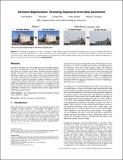Deviation magnification: Revealing departures from ideal geometries
Author(s)
Wadhwa, Neal; Dekel, Tali; Wei, Donglai; Durand, Fredo; Freeman, William T.
DownloadDeviationMagnification.pdf (31.40Mb)
OPEN_ACCESS_POLICY
Open Access Policy
Creative Commons Attribution-Noncommercial-Share Alike
Terms of use
Metadata
Show full item recordAbstract
Structures and objects are often supposed to have idealized geometries such as straight lines or circles. Although not always visible to the naked eye, in reality, these objects deviate from their idealized models. Our goal is to reveal and visualize such subtle geometric deviations, which can contain useful, surprising information about our world. Our framework, termed Deviation Magnification, takes a still image as input, fits parametric models to objects of interest, computes the geometric deviations, and renders an output image in which the departures from ideal geometries are exaggerated. We demonstrate the correctness and usefulness of our method through quantitative evaluation on a synthetic dataset and by application to challenging natural images.
Date issued
2015-11Department
Massachusetts Institute of Technology. Computer Science and Artificial Intelligence Laboratory; Massachusetts Institute of Technology. Department of Electrical Engineering and Computer Science; Massachusetts Institute of Technology. Department of MathematicsJournal
ACM Transactions on Graphics
Publisher
Association for Computing Machinery (ACM)
Citation
Neal Wadhwa, Tali Dekel, Donglai Wei, Fredo Durand, and William T. Freeman. 2015. Deviation magnification: revealing departures from ideal geometries. ACM Trans. Graph. 34, 6, Article 226 (October 2015), 10 pages.
Version: Author's final manuscript
ISSN
07300301